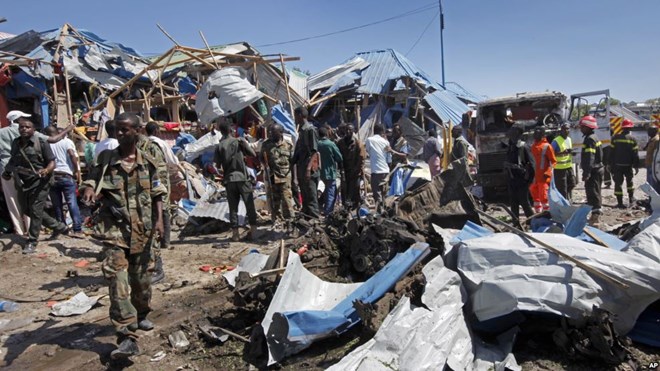
Thursday, December 01, 2016

FILE - Somali soldiers walk through the wreckage after a car bomb that targeted a police station in the Waberi neighborhood, where President Hassan Sheikh Mohamud was visiting a university, in the capital Mogadishu, Somalia, Nov. 26, 2016.
NAIROBI — Somalia’s presidential elections were scheduled for November 30, but the head of Somalia’s electoral body announced Monday they will be postponed.
In the country’s complicated election system, clan and regional delegates have elected roughly 50 percent of the members of the lower and upper houses of parliament.
The presidential election cannot take place until the remaining parliament members are selected. So it will take some more time before lawmakers determine Somalia’s next president, as specified in the Provisional Federal Constitution.
Nairobi-based Somalia affairs commentator Abdiwahab Sheikh Abdisamad says he understands the ongoing “selection process” must be rescheduled, but argues that it should happen soon.
“If the current selection process failed to conclude for the next 15 days, then legitimacy of the head of state, legitimacy of the members of parliament, legitimacy of the members of the senate will be in question,” said Abdisamad.
The head of Somalia’s electoral body said Monday the new president will be elected before the end of the year.
But allegations of bribery, intimidation and improper changes in delegations have plagued the electoral process.
Some people, like Abdi Samatar, a Somali-born economic geographer at the University of Minnesota, say such problems will definitely tarnish the results.
"If I was in a casino, God forbid that, but if I was in a casino, I would bet whatever little resources I have, and over the last 30 years that I have been working, that this will produce a corrupt regime, and will indeed produce more fragments of Somalia than the 2012 [election] or the ones prior to that,” said Samatar. “The level of corruption, culturally, politically, economically, is just beyond this world, frankly.”
Others, like Chatham House research associate Ahmed Soliman, admit corruption is a problem, but say there are some positive signs.
He gives the example of electoral authorities dismissing votes in some regions after officials were found not adhering to the 30 percent female representation quota.
“There are also positive signs just in the very nature of how this election is being followed and is being much more widely reported,” said Soliman. “And social media is being much more widely reported on. And social media is being used to tabulate and count every single seat and every single individual that comes into those seats. So there is a lot of scrutiny that is happening.”
Soliman believes that working on the electoral process is more important than adhering to a strict deadline, at this stage.
In the country’s electoral process, about 14,000 delegates representing Somalia’s clans are electing members to the 275-member lower house of parliament. Regional parliaments are selecting the 54-member upper house of parliament.
Somalia does not yet have a one-person, one-vote electoral system, though many citizens and experts hope that can be achieved in the near future.